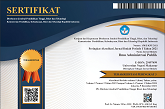The Effect Of Organizational Culture, Work Competency and Discipline on Work Spirit That Impact on Employee Performance at The Business of Transportation in West Jakarta
(1) University of Pamulang, South Tangerang, Banten, Indonesia
(2) University of Pamulang, South Tangerang, Banten, Indonesia
(*) Corresponding Author
DOI: https://doi.org/10.26858/jiap.v11i2.27492
Abstract
This study aims to determine the effect of organizational culture, competence and work discipline on work morale which has an impact on employee performance at the West Jakarta Transportation Agency. The method used is explanatory research with a sample of 125 respondents. The analysis technique uses statistical analysis with regression testing, coefficient of determination and hypothesis testing. The results of this study that organizational culture has a significant effect on work morale by 25.9%, hypothesis testing obtained a significance of 0.000 <0.05. Competence has a significant effect on work morale by 39.0%, hypothesis testing obtained a significance of 0.000 <0.05. Work discipline has a significant effect on work morale by 26.7%, hypothesis testing obtained a significance of 0.000 <0.05. Organizational culture, competence and work discipline simultaneously have a significant effect on work morale by 48.9%, hypothesis testing is obtained a significance of 0.000 <0.05. Work enthusiasm has a significant effect on employee performance by 38.8%, hypothesis testing obtained a significance of 0.000 < 0 ,05..
Keywords
Full Text:
PDFReferences
Bowen, D. E. (2016). The changing role of employees in service theory and practice: An interdisciplinary view. Human Resource Management Review, 26(1), 4–13.
Chimhutu, V., Lindkvist, I., & Lange, S. (2014). When incentives work too well: locally implemented pay for performance (P4P) and adverse sanctions towards home birth in Tanzania-a qualitative study. BMC Health Services Research, 14(1), 1–12.
Daoanis, L. E. (2012). Performance Appraisal System: It’s Implication to Employee Performance. International Journal of Economics and Management Sciences, 2(3), 55–62.
Dapu, V. A. W. (2015). The influence of work discipline, leadership, and motivation on Employee performance at PT. Trakindo utama manado. Jurnal EMBA: Jurnal Riset Ekonomi, Manajemen, Bisnis Dan Akuntansi, 3(3).
Etikan, I., Alkassim, R., & Abubakar, S. (2016). Comparision of snowball sampling and sequential sampling technique. Biometrics and Biostatistics International Journal, 3(1), 55.
Farooq, M., Farooq, O., & Jasimuddin, S. M. (2014). Employees response to corporate social responsibility: Exploring the role of employees’ collectivist orientation. European Management Journal, 32(6), 916–927.
Fatai, A. (2011). Small and medium scale enterprises in Nigeria: the Problems and prospects. RetrievedJanuary15fromwww. Thecje. Com/Journal/Index. Php/Economicsjour Nal/Article/.../8.
Herman, H. (2013). The Needs Of Collaboration In Operating An Open And Distance Learning Institution: Ut Case. Jurnal Pendidikan, 14(1), 31–37.
Ho, V. T., Wong, S., & Lee, C. H. (2011). A tale of passion: Linking job passion and cognitive engagement to employee work performance. Journal of Management Studies, 48(1), 26–47.
Hoff, E. V, Ekman, A., & Kemdal Pho, A. (2019). Fantasy as a driving force: Relations between fantasy and motivation in children. Imagination, Cognition and Personality, 38(3), 250–267.
Maslen, S., & Hopkins, A. (2014). Do incentives work? A qualitative study of managers’ motivations in hazardous industries. Safety Science, 70, 419–428.
Rosmaini, E., Kusumasari, T. F., Lubis, M., & Lubis, A. R. (2018). Study to the current protection of personal data in the educational sector in Indonesia. Journal of Physics: Conference Series, 978(1), 12037.
Sharma, G. (2017). Pros and cons of different sampling techniques. International Journal of Applied Research, 3(7), 749–752.
Snell, S., Morris, S., & Bohlander, G. W. (2015). Managing human resources. Cengage Learning.
Taherdoost, H. (2016). Sampling methods in research methodology; how to choose a sampling technique for research. How to Choose a Sampling Technique for Research (April 10, 2016).
Wolf, J. (2013). Improving the sustainable development of firms: the role of employees. Business Strategy and the Environment, 22(2), 92–108.
Article Metrics
Abstract view : 498 times | PDF view : 76 timesRefbacks
- There are currently no refbacks.
Copyright (c) 2021 Ibnu Sina, Denok Sunarsi

This work is licensed under a Creative Commons Attribution 4.0 International License.
Diterbitkan oleh:
Program Studi Ilmu Administrasi Publik
Program Pascasarjana Universitas Negeri Makassar
JIAP Index By:

This work is licensed under a Creative Commons Attribution 4.0 International License.









